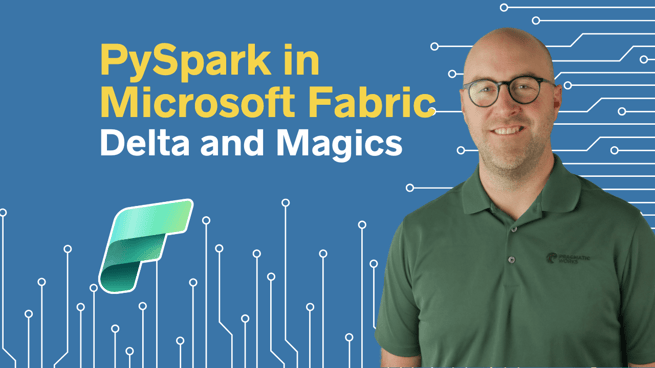Leveraging PySpark with Delta and Magics in Microsoft Fabric

In a recent Pragmatic Works training video, Austin Libal, a prominent trainer within the data engineering ecosystem, embarked on demystifying the intricacies of using PySpark within Microsoft Fabric notebooks. This post aims to distill Austin's comprehensive tutorial into a digestible format, highlighting the essential steps and insights for leveraging PySpark effectively.
Introduction to PySpark and Microsoft Fabric
- PySpark a.k.a. Python for Spark, offers a powerful interface for processing large-scale data, combining the simplicity of Python with the robustness of Apache Spark.
- Microsoft Fabric provides an integrated environment to deploy and manage applications, including data analytics solutions powered by PySpark.
- Austin Libal underscores the importance of setting up a conducive environment, including creating a Lakehouse and preparing the holiday table, as foundational steps before diving deeper into PySpark functionalities.
Deleting and Rebuilding Tables Using PySpark
The tutorial seamlessly transitions from basic setup to advanced data manipulation, demonstrating the process of deleting and rebuilding tables within the Lakehouse:
- Deleting Tables: Highlighting a pragmatic approach, Austin shows how to delete an existing holiday table from the Lakehouse, emphasizing the move from graphical interfaces to code-based management.
- Rebuilding Tables: Through PySpark notebook cells, viewers learn to rebuild the holiday table. This method not only simplifies the process but also enriches the learner's understanding of data frame manipulation and the Delta format's significance in enhancing Lakehouse architecture.
Variable Creation and Data Management
Austin meticulously outlines the steps for creating variables and managing data within the PySpark environment:
- Variable Management: Learners are introduced to the concept of variables in PySpark, with a particular focus on creating string variables for table names. This section illuminates the importance of variables in streamlining data operations.
- Data Writing and Manipulation: The tutorial guides viewers through writing data frames to the Lakehouse tables folder in Delta format. This segment reinforces the value of PySpark in managing and optimizing data storage and retrieval.
Integrating SQL Operations with PySpark
One of the highlights of Austin's tutorial is the integration of SQL operations within the PySpark framework, broadening the applicability of PySpark for SQL-savvy users:
- Temporary Views: Austin demonstrates creating temporary views to bridge PySpark data frames with SQL, allowing for seamless data querying and manipulation using familiar SQL syntax.
- Magics Command: The tutorial introduces the Magics command, a pivotal feature that facilitates switching between PySpark and SQL languages within the same notebook, exemplifying the flexibility of Microsoft Fabric notebooks.
Key Takeaways and Learning Pathways
Austin Libal's tutorial is not just a technical guide; it's an invitation to explore the potential of PySpark in data engineering. Key takeaways include:
- Simplifying Complex Processes: The tutorial demystifies complex data operations, showcasing PySpark's power in managing Lakehouse data efficiently.
- Empowering Through Education: Austin emphasizes the importance of targeted learning, encouraging viewers to focus on specific aspects of Python or PySpark that align with their professional goals.
- Continued Learning Opportunities: Pragmatic Works extends an array of learning opportunities, including On Demand learning and specialized boot camps focused on Microsoft Fabric, aimed at accelerating skill advancement.
Conclusion
Austin Libal's contribution to the Pragmatic Works training series serves as a cornerstone for aspiring and seasoned data engineers alike, seeking to harness the full potential of PySpark within Microsoft Fabric. This tutorial exemplifies the commitment of Pragmatic Works to empower professionals with practical, hands-on knowledge, ensuring they remain at the forefront of technological advancements in data engineering.
In a landscape where data is king, mastering PySpark with the guidance of experts like Austin Libal offers a strategic advantage, enabling professionals to streamline data processes, leverage Microsoft Fabric's capabilities, and ultimately, drive meaningful insights from their data endeavors.
Sign-up now and get instant access

ABOUT THE AUTHOR
Austin is a Jacksonville native who graduated from The Baptist College of Florida in 2012. He previously worked as a manager in the retail service industry. He enjoys spending time with his wife and two kids. His primary focus at Pragmatic Works is on Azure Synapse Analytics and teaching the best practices for data integration, enterprise data warehousing, and big data analytics. He also enjoys helping customers learn the ins and outs of Power BI and showing people new ways to grow their business with the Power Platform.
Free Community Plan
On-demand learning
Most Recent
private training



-1.png)
Leave a comment